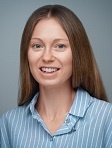 Emily Stanford holds a PhD in Linguistics from the University of Geneva with a specialization in Psycholinguistics.
Emily Stanford holds a PhD in Linguistics from the University of Geneva with a specialization in Psycholinguistics.
Her ongoing postdoctoral research at the University of Geneva, which is an extension of the ERC-funded Syntactic Cartography and Locality in Adult Grammar and Language Acquisition (SynCart) project, investigates whether the acquisition of syntax in typical development is determined by the geometry of the syntactic tree.
In addition, she is the recipient of an Early Postdoc Mobility grant awarded by the Swiss National Science Foundation (SNSF) for which she is currently a visiting postdoctoral researcher at the Università degli Studi di Milano-Bicocca. Her SNSF research aims to examine the diagnostic validity of novel language-independent measures when assessing multilingual children for syntactic impairment.